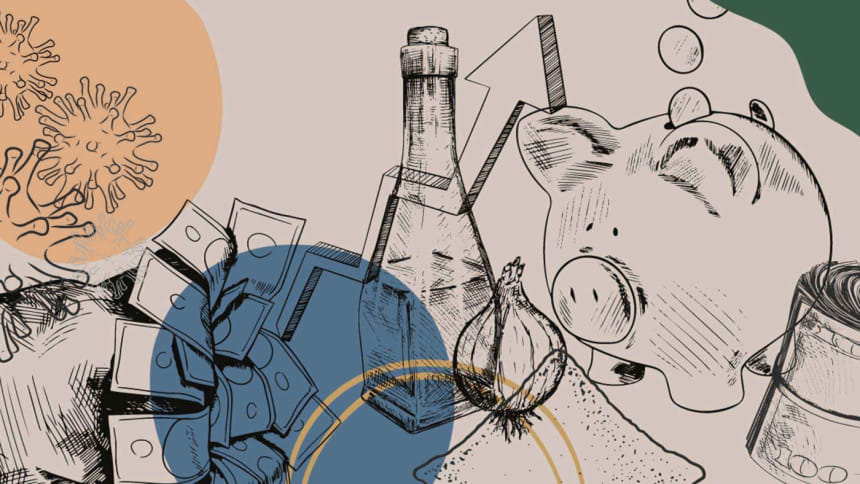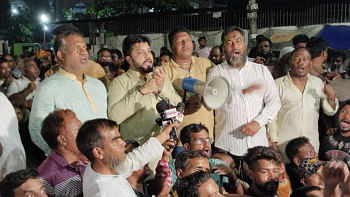Good words and bad math in the new budget

The budget for FY2022-23 is filled with rhetoric. But its credibility is poor because of its contradictions between the priorities and the actual allocations for education, agriculture, health, and the vulnerable population. It doesn't lend credence to the basic understanding of how macro variables such as growth, unemployment, and inflation interact with each other. No wonder the budget is confused between the demand and supply sides. It's unclear what type of inflation the country is facing now and what are the right medicines for that. The math in the budget is also problematic.
Only 64 percent of the Tk 678,064 crore budget is financed by fiscal revenue, suggesting that there has been a gradual erosion of the country's fiscal capacity. Revenue was able to finance 74 percent of the budget some 10 years ago, and 71 percent some five years ago. The downward trend clearly indicates that the government has been gradually losing its proportional fiscal competence, although the capacity was supposed to be rising as the nation moved forward. A separate ministry for revenue mobilisation is crucially needed, and the sooner the prime minister brings about such a reform, the better.
The development stories don't match with the proportionate deterioration in the government's fiscal capacity – which is already one of the lowest in the world. The rosy stories presented in the budget speech ruthlessly contradict the share of education for GDP. It has fallen from a meagre 2.08 percent to 1.83 percent – the lowest in the region. Allocations in social safety net programmes and the healthcare sector didn't see any remarkable increase either, which were necessary after the pandemic-led crisis and job losses.
Unlike the previous budgets, the new one has come up with six priorities – many of which belong to the ministry of planning and the central bank. The budget mysteriously remains silent about what the government should do to bring about a drastic change in revenue collection – which should have made the list of top priorities. Pakistan's FY2022-23 budget, for example, has put revenue mobilisation as its top priority since its fiscal capacity is dwindling. Pakistan's budget is only 12.5 percent of GDP, while Bangladesh's is 15 percent. The British budget, being 42 percent of its GDP, has also outlined how its tax plan will make a surplus budget in three years. Gradually rising the tax-GDP ratio is a standard fiscal mandate, which is quite lacklustre in our case.
Containing inflation is primarily the central bank's mandate, and the fiscal authority can do very little about it. All it can do is support the poor with direct delivery of food items and other essentials. Duties on necessary imports should be lowered and the tax-free income mark should be raised to at least Tk 5 lakh. Given the nature of the inflation which is mainly cost-pushed from the supply side, the budget authority can't handle it. This resembles the Great Inflation of the 1970s when all governments failed until their respective central banks undertook tough monetary contraction, such as the Volcker disinflation in the US.
The fourth priority vows to boost investment – which is contradictory to the number-one priority of depressing inflation. Boosting investment is the central bank's job – a task done by increasing private credit growth – which, in turn, is inflationary. The fifth priority of job creation requires more investment through monetary easing – which the central bank can do by lowering the reserve ratio and slashing the policy rate or the repo rate further down. But that would mean more inflation again.
The finance minister has praised the central bank for raising its repo rate from 4.75 to 5 percent – an insignificant move. Further increases are required given the global situation. The US central bank has been raising its policy rate every six weeks. Its rate hikes of 0.25, 0.5, and 0.75 percent in recent months – never seen in a quarter century – send similar messages to others to raise their respective policy rates. Most countries followed suit. The Bangladesh Bank (BB) is always behind the curve, as we have seen many times. Its exchange rate mismanagement is the reason why the dollar crisis erupted. But the BB should raise the repo rate as well as the reserve ratio if it is seriously looking to curb inflation. These actions, however, will contradict the finance minister's priorities of boosting investment and increasing job creation, suggesting that the budget housed good words with bad math and faulty macro underpinnings.
The budget gives a nominal GDP growth of 11.9 percent. If 7.5 percent real GDP growth is extracted from this number, it gives an inflation rate of [(1.119/1.075) – 1 =] 4.1 percent, while the budget gives an inflation estimate of 5.6 percent. Which one is right? First, the assumption of 5.6 percent inflation is largely a mockery for the poor who are already facing inflation above 15 percent.
Finally, the finance ministry's main strategy would be to increase the supply while reducing the growth in demand (page 42). Consumption, investment, and government spending are the three major components of aggregate demand. How can the government achieve 7.5 percent growth by reducing these driving forces of GDP? A new theory beyond Keynes is needed to address the concept that the ministry of finance has recently manufactured in the budget statement.
Dr Birupaksha Paul is a professor of economics at the State University of New York in Cortland, US, and former chief economist of Bangladesh Bank.

 For all latest news, follow The Daily Star's Google News channel.
For all latest news, follow The Daily Star's Google News channel. 








Comments